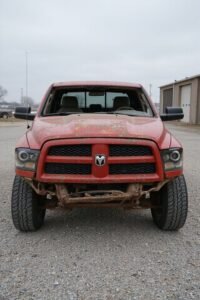You’ll want to avoid the Honda Ridgeline’s most problematic years, particularly 2006-2008 and 2017-2019 models. The 2006 model stands out as especially troublesome with 14 safety recalls and major transmission failures. Early models suffer from electrical issues and cylinder problems, while 2017-2019 versions face significant engine troubles with their V6 powerplants. Understanding the specific issues affecting each troubled model year can help you make a smarter purchasing decision.
The Most Problematic Honda Ridgeline Years at a Glance
Three model years stand out as particularly problematic in the Honda Ridgeline’s history: 2006, 2007, and 2008. These early models faced severe electrical issues, transmission failures, and extensive corrosion problems. Model comparisons reveal that the 2006 Ridgeline was hit hardest with 14 recalls, primarily involving critical safety systems and electrical components. Owner testimonials consistently highlight transmission cooling line defects and HVAC system failures across these years.
While later models showed improvement, the 2010 Ridgeline still struggled with 10 recalls and brake performance issues. Much like the poor turning performance reported in early Chevy Traverse models, the 2017-2018 Ridgeline models shifted toward electronic component failures, specifically with fuel injectors and backup cameras. Similar to the Honda Pilot’s transmission defects in 2005, these issues required costly repairs for many owners. However, these newer issues proved less severe than the thorough problems plaguing the 2006-2008 models. The 2006 model year was particularly notorious for its fourth cylinder failures, leading to expensive repairs for many owners.
Engine Failures and Cylinder Issues in Early Models
While Honda’s Ridgeline has enjoyed a reputation for reliability, significant engine failures plague specific model years, particularly the 2017-2019 lineup with its problematic 3.5-liter V6. These models suffer from premature connecting rod failures due to faulty bearing manufacturing, potentially leading to complete engine seizure or fires. The NHTSA has documented over 400 related incidents, prompting multiple federal investigations. The nearly four-year delay between initial reports of engine problems and the official recall announcement in 2023 left many owners frustrated and seeking solutions.
You’ll also want to watch for fuel injector issues in 2017 models, which can fail around 50,000 miles, causing rough idling and decreased performance. The 2006 model year specifically struggles with #4 cylinder failures. Similar to the recent wiring harness defect found in Polaris ATVs, these manufacturing issues have led to widespread safety concerns. While Honda has issued recalls covering 249,000 vehicles, many owners continue reporting problems despite repairs, suggesting these defects aren’t fully resolved through current intervention programs. Like the Honda CR-V’s third generation problems, these issues have seriously impacted owner satisfaction and resale values.
Transmission Problems That Plague Specific Years
As the Honda Ridgeline evolved through different generations, transmission issues emerged as a significant concern, particularly in the 2006-2008 and 2017-2019 model years. The 2006-2008 models frequently exhibited problems with fourth gear engagement and excessive vibrations at speeds between 40-45 mph.
You’ll find the 2017 models particularly problematic due to torque converter lock-up clutch failures, prompting Honda to issue Technical Service Bulletins addressing the judder issues. The failed fuel injectors caused additional performance complications during this model year. The 2019 models weren’t spared either, with owners reporting rough shifting in higher gears. These transmission types often showed symptoms like harsh downshifts and flaring, which dealer software updates couldn’t consistently resolve.
Watch for transmission fluid leaks and solenoid malfunctions across all affected years, as they can lead to declining performance and potential failure if left unaddressed.
Critical Safety Recalls Across Troubled Model Years
Several critical safety recalls have plagued the Honda Ridgeline, with the 2017-2024 model years facing particularly serious issues that warrant buyer attention. You’ll find the most concerning safety features affected include airbag control units in 2019 models, which could fail during crashes, and faulty curtain airbag deployment systems that don’t meet federal safety standards. The recall history reveals additional major concerns in 2020-2024 models, where rearview camera failures compromise visibility safety. The 2023 model year presents an especially risky steering rack defect that could cause complete loss of control. Earlier models (2017-2019) face multiple challenges, including fuel pump failures and electrical system issues from water intrusion, prompting a stop sale order for connecting rod bearing defects.
Electrical System Failures and Their Impact
Despite Honda’s reputation for reliability, electrical system failures across multiple Ridgeline model years have created significant safety and functionality concerns. The 2017 model faced a major recall due to electrical corrosion in the rear wiring harness, affecting over 9,000 vehicles and causing unintended Vehicle Stability Assist activation. You’ll find persistent dashboard warnings plaguing the same year, with mechanics struggling to diagnose complex electrical faults.
The 2019 model exhibits different but equally concerning issues, including random car alarm activations and rearview camera failures. Earlier models (2006-2008) suffered from HVAC wiring problems that created fire risks. These electrical system failures compromise critical safety features and daily functionality, from disabled backup cameras to malfunctioning collision sensors, making these model years particularly problematic for potential buyers. While the Ridgeline faced these challenges, the Toyota Tacoma rust issues of 2006-2009 demonstrate that even established truck manufacturers can encounter serious quality control problems.
Fuel System Concerns in the 2017 Model Year
The 2017 Honda Ridgeline faces a major fuel system recall affecting 107,000 trucks due to potentially dangerous fuel pump cracks. The issue stems from sulfuric acid in car wash detergents seeping into the fuel pump feed port, causing structural damage that can lead to pressurized fuel leaks and fire risks.
Beyond the fuel leak recall, you’ll want to be aware of separate fuel injector problems in the 2017 model. These issues can trigger rough engine idling and illuminate your check engine light, requiring ECU reprogramming or injector replacement. While Honda’s proactive recall includes free inspection and installation of protective fuel pump covers, the combination of fuel system vulnerabilities makes the 2017 Ridgeline a model year you should approach with caution.
Body and Interior Quality Issues to Watch For
Major body and interior quality concerns plague specific Ridgeline model years, with first-generation trucks (2006-2010) experiencing the most substantial issues. You’ll want to watch for premature rust formation and paint degradation, particularly in 2007 models, which can greatly impact resale value. Interior water leaks reported in 2010 models can lead to mold and damage to cabin components.
The 2006 models suffer from instrument cluster display failures that affect critical driving information visibility. You’ll also need to take into account the 2008 model’s HVAC problems, which often require costly dashboard dismantling for repairs. The 2010 Ridgeline’s soft brake pedal concerns suggest underlying brake system issues that demand immediate attention. These quality control problems were largely addressed in later model years, making newer Ridgelines more reliable choices.
Cost Analysis of Major Repairs by Model Year
Money-conscious buyers should carefully weigh repair costs across different Ridgeline model years, with early models (2006-2008) carrying especially higher maintenance burdens. Analysis of repair trends shows radiator fan motors ($724-$831) and timing belt tensioners ($562-$817) are among the costliest fixes, particularly in these earlier years.
Model comparisons reveal that mid-generation Ridgelines (2009-2014) benefit from improved components, averaging $500 in annual maintenance. However, 2017-2020 models show increased complexity, with five-year maintenance reaching $6,700 and repairs near $3,150. Common expenses across all years include brake pad replacements ($297-$364) and tire pressure monitoring systems ($267-$295). While parts pricing remains relatively stable, labor costs have risen due to newer models’ sophisticated electronics and software requirements.
Best Model Years for Reliability and Performance
Based on extensive reliability data and performance metrics, second-generation Honda Ridgeline models from 2020 onward emerge as the most dependable choices, while 2009-2014 first-generation models offer proven durability at lower price points.
You’ll find the best performance in newer models equipped with the 9-speed automatic transmission, delivering smoother acceleration and improved fuel economy. The reliable engines across both generations maintain consistent power output at 280 hp and 262 lb-ft of torque. The 2020 refresh particularly stands out with minimal complaints and enhanced build quality.
For value-conscious buyers, 2009-2014 models demonstrate solid reliability with their tried-and-true 3.5L V6 and 5-speed automatic combination. These years saw fewer recalls and mechanical issues compared to earlier first-generation models, making them smart used-vehicle options.
Expert Tips for Buying a Used Honda Ridgeline
When shopping for a used Honda Ridgeline, understanding common issues specific to each model year can help you make a smart investment. For ideal used vehicle considerations, steer clear of the 2006 first-generation model, which suffered from serious engine problems, and the 2017 model, known for fuel injector failures. You’ll also want to avoid 2019 models due to their electrical and transmission issues.
Before purchasing, thoroughly inspect the maintenance history, particularly focusing on transmission service records and recall compliance. Check for structural repairs around the hood latch and tailgate areas on 2017-2020 models. Pay special attention to fuel pump components, especially if the vehicle was frequently run through car washes, as sulfuric acid exposure from soaps can cause critical damage.



